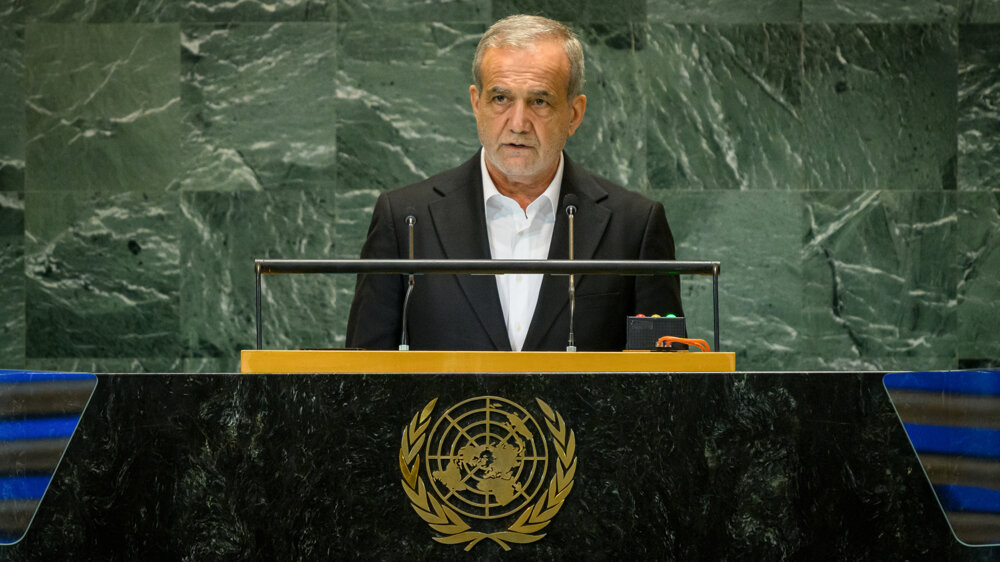‘Global peace hinges on end of Israeli aggression’
Pezeshkian asks the international community to curb Israeli violence in first UN address

TEHRAN – Iranian President Masoud Pezeshkian has intensified alarm over the repercussions of Israel’s ongoing aggression in West Asia, warning that the decadence of peace in the region will eventually impact other parts of the world.
Addressing the session on “Strengthening the United Nations Goals” at the United Nations headquarters in New York, the president demanded a cessation of the Israeli occupation and apartheid in Palestine and immediate implementation of a ceasefire in the Gaza Strip, where the regime has been waging a genocidal war for over 11 months.
“Cessation of the [Israeli] occupation and apartheid in Palestine and immediate ceasefire in Gaza are preconditions for international development and peace,” he insisted.
“In a world where civilians are being killed ruthlessly in Gaza, blind state terrorism sheds the blood of children and women, and genocide and assassination is being supported, [conclusion of] no document would serve to guarantee peace and development,” Pezeshkian stated, noting that no UN session will help bring peace to the world until Israel has been held responsible for its crimes.
The establishment of the Israeli regime in 1948, following a Western-backed war against the Palestinian locals, resulted in the occupation of vast Palestinian territories. In 1967, another war led to the occupation of the West Bank, including East Jerusalem, and the Gaza Strip.
Since then, Israel has implemented a system of apartheid in the Arab lands, building numerous settlements and imposing severe restrictions on the Palestinian nation. The regime withdrew from Gaza in 2005 but maintained a comprehensive land, air, and sea blockade of the territory since the following year.
Gaza has also been hobbled by multiple waves of Israeli violence in the past decades, the most recent of which began in October of 2023 after a successful Hamas operation against Israeli positions in the occupied territories. The regime’s latest war in the besieged and impoverished strip has so far resulted in the deaths of over 41,500 Palestinians, a number that’s expected to rise to at least 180,000. The majority of victims have been women and children as the regime is unable to fight military forces that have entrenched positions under the ground.
In his other remarks regarding the establishment of global and regional peace, Pezeshkian reiterated Iran’s stance regarding the need to eliminate weapons of mass destruction
“Iran demands a strong, united, safe, and stable region, where the resources of the regional countries are used for [bringing about] synergy towards [realization of] economic and social development and disposal of common problems,” he said.
Highlighting Iran's role in promoting regional stability, the president emphasized Tehran’s consistent leadership in combating terrorism. He expressed Iran's willingness to collaborate with other nations genuinely committed to confronting this global threat.
Iran has been spearheading the fight against terrorists in West Asia for long years. Its most acknowledged military figure, Lieutenant General Qassem Soleimani, who is credited with defeating Daesh terrorists during the 2010s was assassinated by the U.S. during a trip to Baghdad in 2020.
In his address, the president condemned the unilateral sanctions imposed by the United States and its allies on Iran and other nations. He asserted that such sanctions hinder the realization of sustainable development goals and the need to abolish them in any future international agreements.
Pezeshkian proposed that UN Secretary-General António Guterres present the General Assembly with a comprehensive report on the impact of these sanctions, compiled in collaboration with affected countries.
He emphasized that achieving peace and development necessitates respecting nations' right to development, upholding fairness, and fulfilling commitments made by developed countries to developing nations. Pezeshkian called for immediate reform of the international financial institutions to ensure the inclusion of developing countries in decision-making and norm-setting, advocating for a just system that addresses their financial needs.
In his concluding remarks, Pezeshkian outlined his administration's practical priorities, putting on healthcare, education, welfare, creating equal opportunities, ensuring fair income distribution, reducing poverty and discrimination, and empowering women and youth. “Let us create a just and prosperous future for our children,” he suggested.
